-
TrackoBit
Manage commercial vehicles with the new-age Fleet Management Software
TrackoBit -
TrackoField
Streamline your scattered workforce with Field Force Management Software
TrackoField -
Features Resources
-
Blog
Carefully curated articles to update you on industrial trends. -
White Paper
Insightful papers and analysis on essential subject matters. -
Glossary
Explore an alphabetical list of relevant industry terms. -
What’s New
Get TrackoBit & TrackoField monthly updates here. -
Case Study
Explore the cases we solved with our diverse solutions. -
Comparisons
Compare platforms, features, and pricing to find your best fit.
-
About Us
Get to know TrackoBit: our team, ethos, values, and vision. -
Careers
Join the most dynamic cult of coders, creatives and changemakers. -
Tech Support
Learn about our technical support team and services in detail. -
Events
Check out the exhibitions where we left our marks and conquered. -
Contact Us
Connect with us and let us know how we can be of service.
6 Reasons Why Automated Route Planning Better Than Manual
- Author:Nandita Gupta
- Read Time:5 min
- Published:
- Last Update: June 24, 2024
Table of Contents
Toggle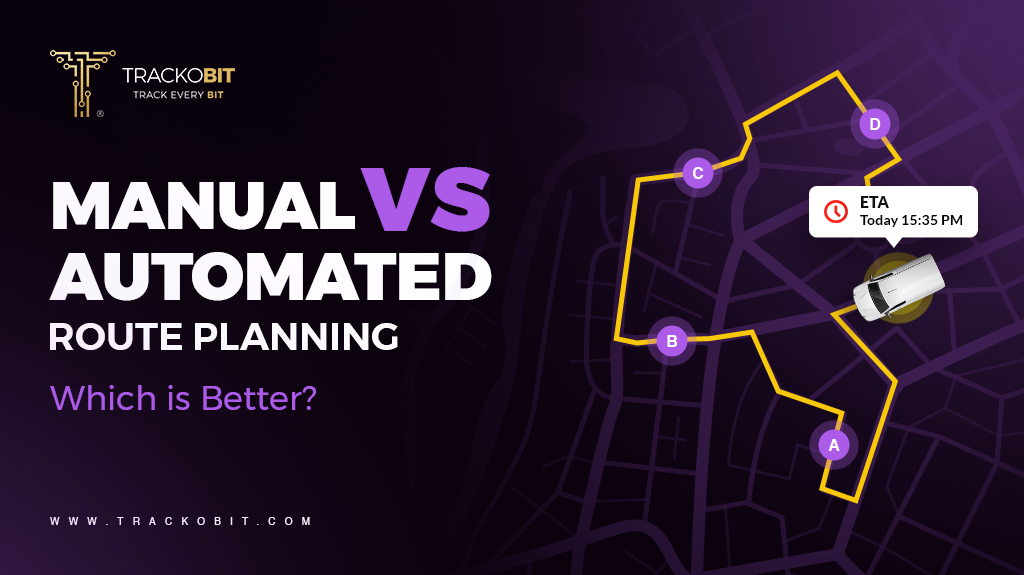
In the age of AI and automation, do you still resort to manual routing? Switch to automated route planning today, and see your fleet efficiency skyrocket.
Table of Contents
Toggle
As a vehicle fleet operating business, you would agree that efficient route planning is the backbone of fleet management. As this not only impacts operational costs but also determines driver productivity. Enhanced customer satisfaction with on-time deliveries while keeping environmental sustainability in check is a BONUS!
But, What is route planning?
Route planning is a process through which you can determine the most optimized routes to save time, and costs and increase the efficiency of the fleet.
The challenges of traditional routing and navigation techniques have given birth to quick, efficient, and integrated automated route planning systems.
| Imagine, you own over 150 commercial vehicles. Planning trips for each vehicle, taking care of their well-being, managing an equal number of drivers and supervising overall operations too.
Now You have to do it all manually! Ehh…scary right? |
Opting for automated route management software & methods is more of a necessity than a choice. If you are still not convinced and are battling with manual vs automated route planning, let’s help you understand how automated logistics route planning is a plus for your business.
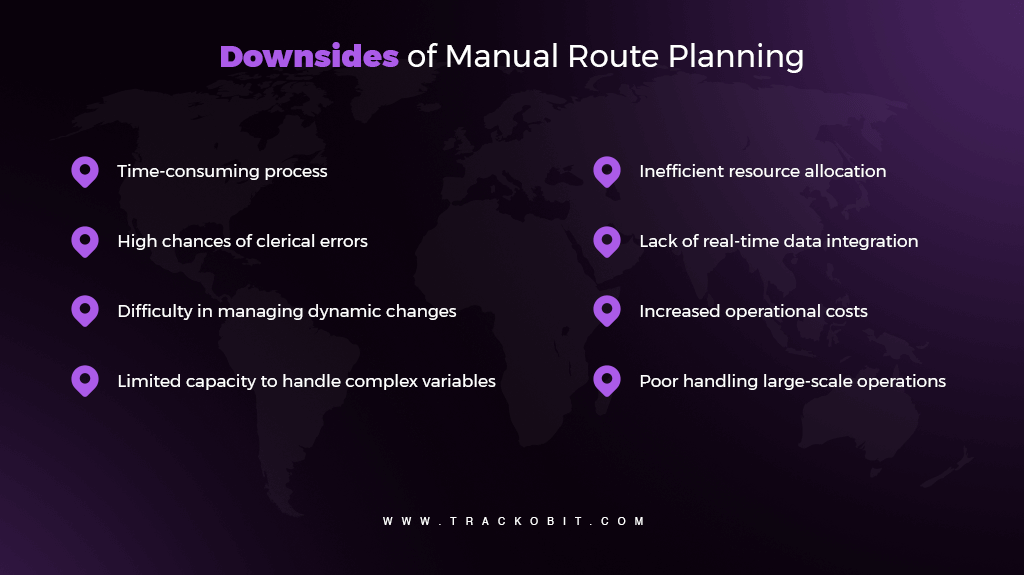
6 Reasons to Opt for Automated Route Planning Software
Here are reasons to opt for automated route planning over manual methods.
1. Maximised Efficiency & More Time Savings
Automated route planning systems embed advanced algorithms that help get real-time data to identify the most efficient routes for any no. of vehicles. The best thing is, these systems suggest routes while taking into account various variables like:
- Traffic conditions
- Delivery time windows
- Vehicle capacities
- Driver’s availability
By pre-calculating routes, businesses can save on travel time, fuel consumption, and miles which ultimately saves their operational costs.
Additionally, another best part of automated systems is their dynamism to optimize routes according to sudden weather conditions or traffic congestion. It allows your dedicated drivers to adjust routes to stay focused on timely deliveries and better customer service.
2. Accurate Data Future Planning
You must have experienced some clerical errors while doing manual route planning. Maybe, a misjudgement of the exact delivery distance or overlooking a specific delivery requirement. Thereby, automated route planning systems come into play.
They help you analyze any size of data and lead to accurate route planning. You just enter delivery addresses, arrange the preferred sequence, and mention the max halt time, and the rest of it will be automated for you.
What’s best is that these systems analyze various parameters like:
- Vehicle speed limits
- Traffic-prone areas
- Halt durations
All these factors altogether help fleet managers plan trips and deliveries optimally. Moreover, this accuracy even reduces the chances of multi stops trips, and wrong turns while keeping in check customer dissatisfaction. All this together helps businesses achieve better operational efficiency.
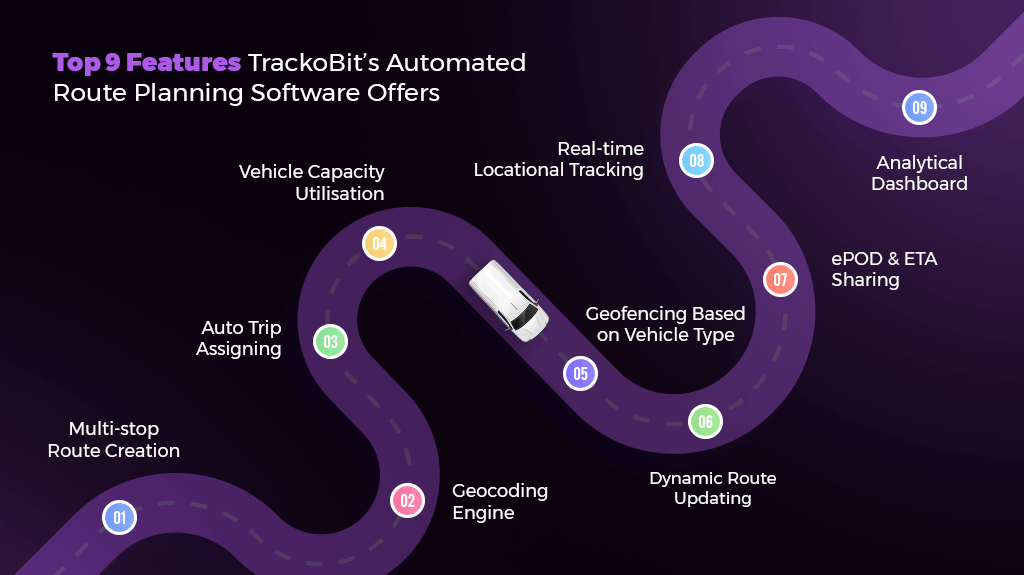
3. More Productivity and Better Resource Optimization
Automated route planning systems help with better optimization & allocation of resources. This helps ensure that every vehicle in the fleet is getting utilized at full capacity. Moreover, the system is smart enough to assign tasks to vehicles based on their carrying capacity and delivery instructions. This further eliminates the waste trips and optimizes the no. of resources required for operations.
And this further yields better business productivity while reducing fleet size, fuel consumption, and overall maintenance costs. With one smart move, businesses can incentivize financial savings big times.
4. Real-Time Adaptability and Flexibility
Manual route planning cannot adapt quickly to unforeseen circumstances or last-minute changes. Whereas in contrast, automated route planning systems are highly flexible towards uncalled-for events. They can easily take into account real-time traffic updates, weather conditions, and other relevant data for adjusting routes at a quick turnaround.
Suppose, there is a last-minute order request, the system automatically adjusts ad-hoc tasks without trading off optimal route planning. This flexibility helps your business avoid delivery delays while strengthening customer satisfaction and trust.
5. Maximized Safety and Compliance
As a business on the go, prioritizing safety is a must. With automated route planning systems, you can stay ahead of the curve by avoiding unnecessary route deviations, traffic-prone areas and time-consuming routes.
By optimizing and generating routes while keeping these fatalities in mind, you can easily mitigate risks pertaining to drivers’ and vehicles’ safety and goods in transit (if any).
Furthermore, these systems also remind you of servicing due dates, timely renewal of licences, travel permits, and much more. This helps in steering clear of penalties and maintaining a positive brand reputation.
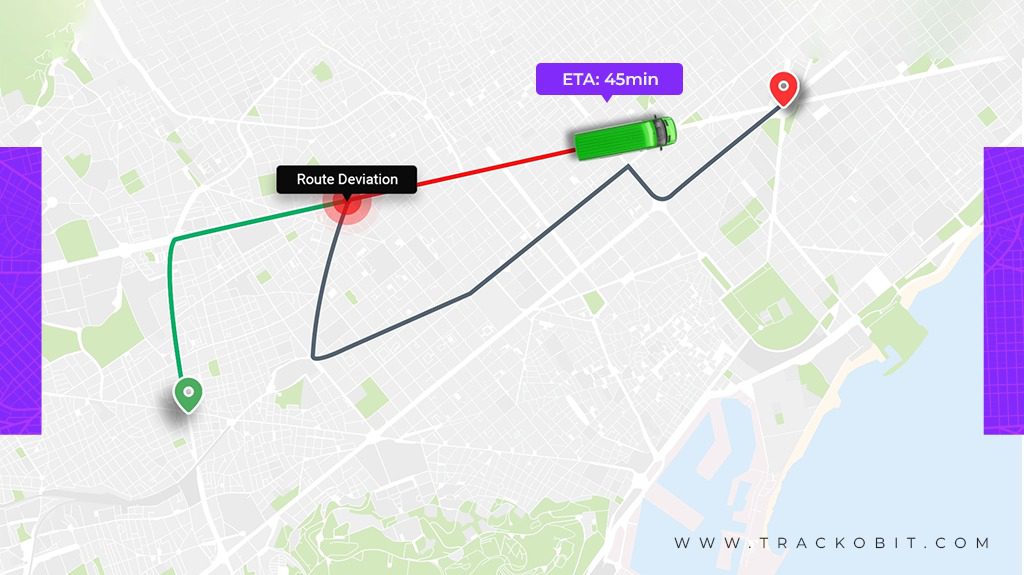
6. Data-Driven Insights and Better Optimization
These advanced logistics route planning systems help provide comprehensive data and analytics for better insights into fleet performance. As a business, you can get detailed, visualized reports stating the vehicle’s mileage, fuel consumption, delivery times, and driver’s productivity throughout the route.
With these meaningful data resources, as a business, you can make data-driven decisions, identify scope for improvement and deploy optimized strategies. Furthermore, in the long run, your business can witness more streamlined operations while avoiding bottlenecks proactively for enhanced efficiency and profit margins.
7. Enhanced Business Scalability
Manual route planning is very challenging when you are growing the fleet size. It gets taxing to evaluate each vehicle’s routes that too without making any clerical errors or redundancy.
Automated route planning systems help in putting manual efforts at a halt by automating the entire process. The route management software is flexible to use for businesses with any fleet size and with any changing needs.
No matter if you are expanding your delivery territories, adding new vehicles, or maybe scaling operations, the automated route planning software will help optimize routes to support seamless scalability & adaptability.
Hope now you have clarity on reasons to opt for automated route planning.
Final Thoughts on Why Automated Route Planning is Better than Manual
Automated route planning is changing the face of fleet management by replacing manual efforts. With automated route planning, businesses can thrive on accuracy, optimal efficiency, safety, and flexibility. Turning towards automated systems further can help your business achieve:
- Efficient travel and deliverables
- Enhanced productivity
- Reduced operating costs
- Enhanced customer satisfaction
- And better safety & compliance
It’s high time for fleet businesses to leverage the best route planning software 2024 if they wish to maximize resource utilization and earn a distinction in the competitive marketplace. Enquire us if you wish to power your fleet with advanced automated route planning systems.
Frequently Asked Questions on Automated Route Planning
-
What is automated route planning?
Automated route planning is the process of optimizing and generating optimal routes for the range of transportation, logistics, or any delivery operations.
-
Manual vs Automated Route Planning - which is Better?
Automated route planning is best for small, medium and big fleets alike. However, small fleets can rely on manual route planning if they do not have complex operational requirements. But businesses that own 150+ vehicles need more scalability, time efficiency, and accuracy, and for that, they must opt for reliable route management systems.
-
Why plan routes with TrackoBit rather than using Google Maps?
Route planners like Google Maps do basic route planning with limited stops and halts. When you consider our sophisticated route planning software, you enjoy the heightened capability of setting multiple stops and sequencing them in order of priority or urgency. Plus, you get the option to define the duration of staying at these halts for your drivers. You can opt for alerts whenever these waypoints or halts are covered or drivers’ are exceeding the operational time.
-
What is route mapping in logistics?
Route mapping is the process of identifying the most efficient routes while evaluating factors such as traffic, mileage, delivery schedules, etc. With these efficient routes, you achieve savings on fuel, travel time, and overall operational costs.
-
What are the advantages of route planning?
Businesses involved in transportation, delivery, or logistics need to have proper route planning to ensure timely good deliveries, improved customer satisfaction, and optimized operating costs.
-
Which industries benefit from using automated route planning software?
Route planning software by TrackoBit is beneficial for managing trips for industries like logistics and transportation, e-commerce, field services, food delivery, and healthcare.
Essentially, businesses that want to automate tasks on trip assignments, and keep consignment delivery on schedule can benefit from our route planning software.
Nandita is the Team Lead for Content Marketing at TrackoBit, bringing over a decade of experience in B2B, B2C, and IoT sectors. She has a proven track record of helping Read More
Related Blogs
-
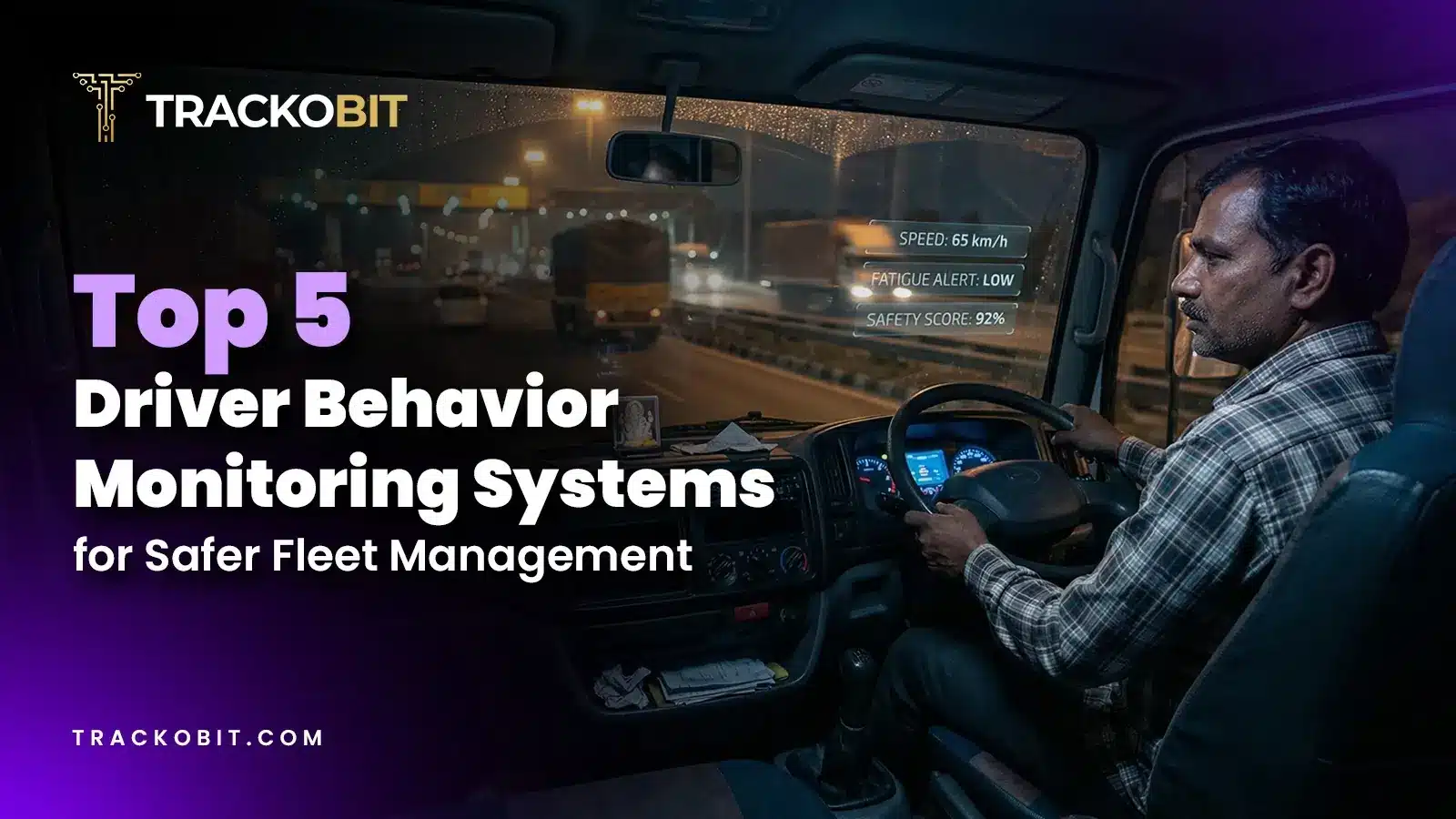
5 Best Driver Behavior Monitoring Systems for 2026
Tithi Agarwal February 23, 2026Having the best driver behavior monitoring system is a necessity as it helps you ensure driver safety and optimize operational…
-

Why is Driver Drowsiness Detection System Important for Fleet Management?
Shemanti Ghosh February 4, 2026A driver drowsiness detection system is critical for fleet management. It helps prevent fatigue-related accidents and reduces operational risks through…
-
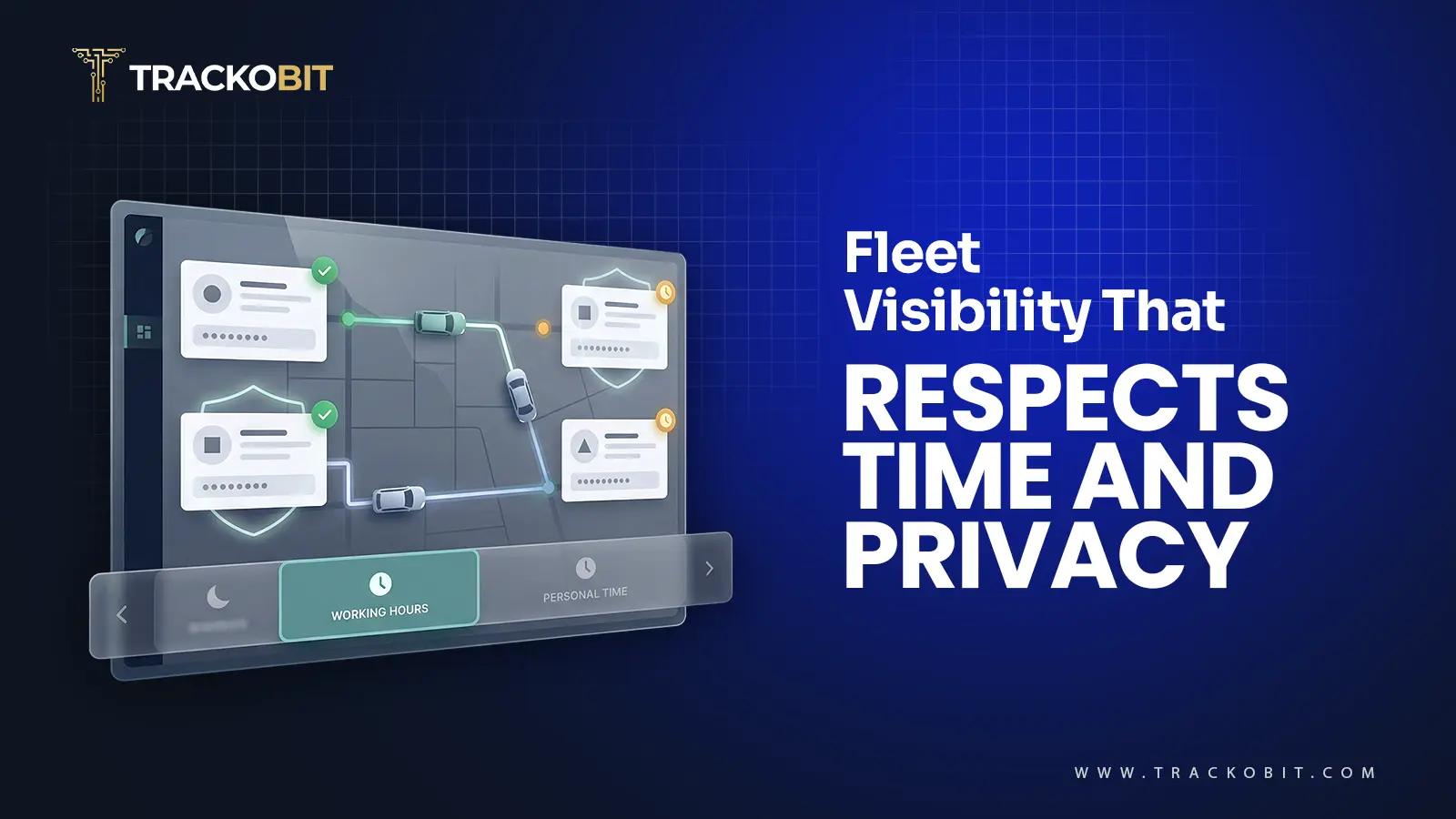
When Tracking Needs a Clock: Rethinking Fleet Visibility
Tithi Agarwal December 24, 2025Read on to understand why fleet tracking works better when it follows working hours. Because visibility should support operations, not…
-

What Makes TrackoBit’s Video Telematics Software Truly Next-Gen?
Shemanti Ghosh December 17, 2025TrackoBit’s video telematics software blends smart video intelligence with full server control. The result? Superior fleet reliability and safety.

Subscribe for weekly tips to optimize your fleet’s potential!
Your inbox awaits a welcome email. Stay tuned for the latest blog updates & expert insights.
"While you're here, dive into some more reads or grab quick bites from our social platforms!"Stay Updated on tech, telematics and mobility. Don't miss out on the latest in the industry.
We use cookies to enhance and personalize your browsing experience. By continuing to use our website, you agree to our Privacy Policy.







































